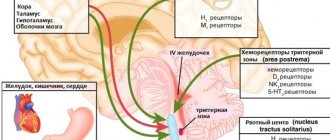Vomiting in infants
In the absence of symptoms, namely fever, bile in the vomit, or blood in periodic vomiting in newborns, parents should not worry in vain.
Morning vomiting and its recurrence throughout the day can be a result of the baby's improper latching of the nipple or pacifier. As a result, air enters the stomach along with the milk. In this case, it’s not even vomiting, but regurgitation. To ease the baby's condition, you should hold him upright for several minutes after feeding. The baby will burp air with a small amount of milk.
The cause of vomiting in a baby in the morning or during the day may be banal overeating. It often happens in cases where the mother is inexperienced. At the slightest cry of the child, she gives him a breast or pacifier.
In infants, the stomach is still underdeveloped. When it overflows, a signal of oversaturation is sent to the brain, the stomach goes into spasm, and the esophagus expands. A significant amount of milk spills out.
Forecast and consequences
Nausea itself, other than an uncomfortable sensation, does not cause harm to the body. It is a signal to parents that something is wrong with the child. Therefore it requires close attention.
Sometimes it can cause negative consequences:
- Frequent attacks can provoke a refusal to eat. And this will lead to a lack of nutrients, minerals, and vitamins in the child’s body.
- If nausea is accompanied by frequent and repeated vomiting, then dehydration develops.
- Nausea and vomiting are especially dangerous in young children. Stomach contents may enter the respiratory system. The airways will become blocked or inflammation will occur. In these conditions, the child requires emergency medical care.
If nausea in a teenager is not associated with any disease, then most often it goes away with the end of puberty.
Vomiting without symptoms
Vomiting in the morning does not mean that you need to urgently call a doctor.
With normal asymptomatic vomiting, attention should be paid to the child’s mental state.
In children of primary school age it may be of a nervous nature. For first-graders - due to the fact that they are not yet accustomed to the new team. For older children, the cause may be a conflict in the class or an unreasonably biased attitude of the teacher towards them. If the problem is solved, morning vomiting before school will go away on its own.
There is no need to worry that your child has vomiting in the morning, even in cases where he had no appetite before breakfast. Waking up early is sometimes the reason for not wanting to eat breakfast. But parents begin to force feed. The body's rejection of food at this time of day causes stomach spasms followed by vomiting.
In case of occasional vomiting in the morning, there is also no need to worry. It is possible that the breakfast was too rich. Or the morning dish was with the addition of smoked and fried meats. The body of children, especially young children, is not able to cope with such food.
Prevention
To protect a child from nausea, it is necessary to prevent diseases that can cause it.
Doctors recommend adhering to the following general recommendations to prevent the development of an unpleasant condition:
- compliance with the principles of rational nutrition;
- refusal to overeat;
- exclusion of stressful situations;
- normalization of the daily routine, proper sleep;
- sufficient exposure to fresh air;
- hardening and general strengthening activities (exercise, physical education).
Nausea is an unpleasant feeling that occurs in children of any age. Having found out the reason for its development, parents can adequately help their child. There are many ways to eliminate painful symptoms in the epigastrium. But only a doctor should select them. Do not forget that nausea in a child is a serious reason to see a doctor. After all, sometimes it is through nausea that the baby’s body “screams” for help!
Source: lechenie-simptomy.ru
How can I help you?
There is no need to overfeed your child or force him to eat. Especially if it is heavy flour, fried or fatty foods. Eating this way in the morning is not healthy even for an adult. It is better to have light oatmeal or muesli with milk for breakfast.
For nervous vomiting, ask your child about relationships with classmates or the teacher. During this period, there is no need to scold your child for bad grades in class or for behavior. Timely intervention and psychological support will help him adapt faster. After an attack of vomiting, you should give the child a glass of clean water. The baby's condition will improve significantly.
The cause of vomiting in a child of any age is often a viral respiratory disease. He suffers from a dry cough in the morning and in the evening, which can cause stomach cramps and vomiting. Also, the cause of vomiting during a virus can be a profuse runny nose. Mucous secretions accumulate in the nasopharynx, causing a gag reflex.
In this case, you need to give the child antiviral herbal teas, rinse the nose, and do inhalations using essential oils or other means that alleviate the condition.
The main reasons for the appearance of symptoms in a child
If nausea bothers the child very rarely, goes away on its own and does not cause much discomfort, then in this case there is little reason for concern. In the opposite situation, it is imperative to go with the little patient to a consultation with a specialist.
There are many reasons for morning sickness.
Pathology of the gastrointestinal tract:
- chronic inflammation of the stomach and intestines (gastric and duodenal ulcers, gastritis, duodenitis, reflux, constipation, ileitis, colitis);
- chronic diseases of the gallbladder, its ducts, pancreas (cholecystitis, cholangitis, dyskinesia, pancreatitis);
- food allergies;
- various nutrient malabsorption disorders;
- acute lesions at the beginning of the development of the pathological process (appendicitis, intestinal obstruction, peritonitis);
- disturbance of peristalsis of any part of the gastrointestinal tract;
- foreign bodies;
- developmental anomalies (atresia, rotation disorders, stenoses);
- bleeding from the gastrointestinal tract;
- poisoning (food poisoning).
Metabolic and endocrine system disorders:
- adrenal insufficiency;
- thyrotoxicosis;
- ketone poisoning in diabetes mellitus;
- phenylketonuria, galactosemia, fructose intolerance;
- obesity (increased pressure inside the abdominal cavity, compression of the stomach, reflux - backflow of the contents of the stomach or intestines).
- bacterial (salmonellosis, dysentery, escherichiosis);
- viral (rotavirus, enterovirus, noravirus);
- parasitic (ascariasis, giardiasis, enterobiasis);
- general infections of the respiratory system, urinary system, nervous system, occurring with high fever (especially in young children).
Damage to the central nervous system:
- increased pressure inside the skull (more often in infants and young children) due to tumor, hydrocephalus, inflammation;
- migraine (especially in teenage children);
- injury;
- epilepsy (in the form of an aura before an attack).
Vestibular system disorders:
- inflammation of the labyrinth of the inner ear, manifested by dizziness;
- motion sickness (in transport, seasickness).
Diseases of the heart and blood vessels:
- increased blood pressure (hypertension) or decreased blood pressure (hypotension);
- chronic heart failure with congenital heart defects.
- poisoning with drugs, toxic substances (paint, household chemicals, glue);
- chemotherapy for cancer.
If all pathological causes of discomfort in the stomach are excluded, then we can talk about functional nausea syndrome.
Its criteria are:
- the occurrence of a painful phenomenon at least 3-4 times a week;
- nausea is not accompanied by vomiting;
- the absence of any diseases that provoke it.
The causes of nausea can also be factors determined by the child’s behavioral characteristics (psychogenic):
- anxiety (fear of a performance, an important event, an exam);
- unpleasant associations with food products (pasta - worms, sausage - feces, etc.);
- severe tantrums as a reaction to stress;
- negative emotions;
- constant pressure to eat (especially in older children).
In addition, doctors identify several more points that can provoke negative feelings:
- Nausea can occur during adolescence. This is due to the restructuring and active growth of all body systems, with the manifestation of emotional instability. It is observed in girls during the formation of the menstrual cycle.
- Children may experience stomach discomfort in the morning when they are hungry. This is due to irritation of the mucous membrane with hydrochloric acid. Impulses through the vagus nerve system go to the center of hunger, located next to the emetic.
- Nausea can also occur after eating. If this condition is not associated with pathology of the digestive organs, then it occurs due to overstretching of the walls of the stomach. And reflexively, sending signals to the brain, the body tries to get rid of excess volume.
When is the best time to see a doctor?
Serious causes of a gag reflex in the morning indicate the presence of a complex disease. In cases where a child experiences nausea, begins to vomit after each meal, masses with a small amount of blood come out of the stomach, and the body temperature is slightly elevated, the presence of acetone in the body may be the cause.
A common cause of morning vomiting in a child is brain diseases, including tumors. The patient has been complaining for a long time of attacks of nausea and headaches, which are the cause of increased intracranial pressure.
If you have abdominal pain and sometimes vomit blood, doctors confuse these diseases with diseases of the gastrointestinal tract. The symptoms in these cases are very similar. If, in addition to the fact that the child vomits in the morning, he has frequent urination and increased thirst, diabetes mellitus is possible. Frequent vomiting with a clear developmental delay in the child may indicate celiac disease.
Vomiting can also be caused by an infectious disease. Vomiting is accompanied by severe diarrhea, body temperature rises, and sweating is observed. A simple rapid test will show an increased level of acetone in the urine.
Eliminating nausea
Drug treatment
- If the baby vomits, then use antiemetic drugs: Smecta (for children over 1 month), Cerucal (used for children over 2 years).
- If there is vomiting, be sure to use rehydration solutions - Regidron, Gastrolit, Orasan. These are glucose-saline solutions that retain fluid in the child’s body and reduce the likelihood of dehydration. You can prepare the solution yourself: in 1 tbsp. boiled water add 1 tbsp. sugar and 1 tbsp. salt.
READ ALSO: the best antiemetic drugs for children in case of poisoning
- For nausea caused by intestinal infection, Enterofuril, Furazolidone, Ciprofloxacin are prescribed (we recommend reading: indications for the use of the drug "Enterofuril" for children).
- In case of intoxication of the body, sorbents are used that absorb toxins: Polyphepan, Polysorb, Enterosgel or regular activated carbon.
- Elevated body temperature is brought down with Nurofen or Calpol syrups, and for children under one year old it is better to buy antipyretic suppositories Tsefekon D.
Folk remedies
There are traditional methods of combating nausea. However, you should not completely rely on traditional medicine; it is better to show the child to a pediatrician.
- A decoction of dill seeds can reduce vomiting (brew 1 tsp in 200 ml of hot water and leave in a steam bath for about 5 minutes). Drink 20-50 ml every 2 hours.
- Frequent vomiting stops after using a milk-yolk mixture (1 tbsp. warm milk and 1 yolk).
- A decoction of valerian roots soothes the stomach: 1 tsp. Pour a glass of boiling water over valerian root and cook in a steam bath for 15 minutes. Take 20 ml 4 times a day.
- Mild nausea can be relieved with lemon balm and mint tea.
- Sucking on lemon slices also eliminates the feeling of nausea.
- Loose stools are normalized with starch. It is best to cook thick jelly from frozen fruits at the rate of 1 tbsp. starch per glass of finished product. Drink half a cup several times a day.
If home remedies do not relieve the symptoms and the child continues to feel sick, you should consult a doctor.
Loading…
Share with friends!
What should I do?
You should not feed your baby immediately after vomiting. We need to put him to bed and give him fluids in small increments until the doctor arrives. If the child’s condition is not critical, there is no need to urgently hospitalize him; he should undergo blood and urine tests for high sugar levels or the presence of acetone, undergo an ultrasound of the internal organs, and a computed tomography scan of the brain.
In mild cases, bed rest and a special diet are indicated. The doctor prescribes the necessary medications.
In any case, when a child vomits, including in the morning, you should carefully consider his condition and provide first aid. If you experience frequent vomiting with clear suspicious symptoms, you should immediately seek medical help.
Treatment
Initially, you need to contact your pediatrician. The doctor will examine the child, find out what he is complaining about, assess his general well-being, and, if necessary, refer him to a specialist, who may include:
- gastroenterologist - will help in situations with diseases of the gastrointestinal tract, therapy can be either at home or in the hospital, medications are used, and dietary nutrition is prescribed;
- neurologist - will prescribe medications; physical procedures, in particular massage, can also be prescribed;
- the surgeon will help if there is a condition that requires surgical intervention.
- If vomiting occurs while the child is being treated with antibacterial drugs, then it is necessary to report the incident to the doctor who prescribed this drug. Most likely, the specialist will cancel his appointment.
- If you suspect that the baby has a head injury, in addition to vomiting, there is also dizziness and headache, then you need to take the child to the hospital as quickly as possible. In such a state, it is extremely important to have absolute peace. The doctor may prescribe intramuscular or intravenous injections.
- If a child has appendicitis, abdominal pain, and a high temperature, then it is necessary to urgently call an ambulance. The baby's condition can only be alleviated through surgery. This must be done as quickly as possible to prevent the development of life-threatening peritonitis.
- If vomiting is caused by severe stress, then you need to seek advice from a psychologist who will be able to understand the child’s condition, identify the true problem, and help solve it.
- If the child ate too much the day before, for example, there was some kind of feast in your house, the baby ate without stopping, then you can alleviate his condition by rinsing his mouth after vomiting and giving the little one hot tea. You can also give your baby Linex in an age-appropriate dosage.
- In case of an intestinal infection, if a child has a rotavirus infection, then it can be treated at home; if there is salmonellosis, then he needs hospitalization and inpatient therapy. A child in this condition needs to wash his face with cool water, rinse his mouth, and after vomiting, it is important that the baby takes some enterosorbents to remove toxins from the body. If there is a high temperature, the baby is given an antipyretic in the appropriate dosage, after which the little one begins to drink it often in tiny portions.
- If vomiting is the result of general intoxication of the body with elevated temperature, then the symptoms of this condition are removed by the use of sorbents, for example, Enterosgel, and taking an antipyretic. It is important to provide the baby with bed rest and give him warm tea.
- If the cause of vomiting is a gastrointestinal disease, then it is better to immediately consult a doctor, perhaps an exacerbation of a chronic illness.
- If food poisoning occurs, for example, the child ate some kind of cake or other questionable food the day before, as a result he vomited in the morning and there is diarrhea, the temperature rises, it is necessary to adhere to the following sequence of actions:
- if the child has reached the age of five, then you can try to rinse the stomach, give the baby a glass with a very weak solution of potassium permanganate;
- after the little one drinks it, you need to try to artificially provoke an attack of vomiting by pressing on the root of the tongue;
- after washing, the child is allowed to take enterosorbent;
- The baby is often given small portions of liquid, water or tea, or rice water.
Preventing morning sickness and vomiting
In order to prevent nausea and vomiting, you must follow a few simple rules:
- wash vegetables and fruits thoroughly;
- bring dishes to full readiness;
- observe food storage conditions and monitor expiration dates;
- do not cook too fatty foods;
- do not overcook food;
- undergo clinical examinations for various diseases on time;
- strengthen the baby’s immunity with morning exercises and hardening;
- get vaccinated in a timely manner;
- maintain a healthy diet and sleep pattern;
- monitor the child’s emotional state.
Nausea at night and in the morning: diseases - causes and characteristic signs, treatment features
In order to prescribe the correct treatment and help the child cope with vomiting, its cause must be accurately determined.
Otherwise, incorrect therapy can lead to worsening of the condition and the development of complications. In newborns, parents must learn to distinguish vomiting from regurgitation, in which there is no fuss and the masses do not smell. The main causes of vomiting without fever in infants are overfeeding, overheating, improper complementary feeding, malnutrition of the mother, food poisoning, cholestasis, head injuries, acetone syndrome, and ingestion of foreign objects.
In older children, vomiting can be caused by poisoning, head injuries, intoxication, excess dosage of medications, strong cough reflex, unbalanced diet, psycho-emotional stress, endocrine system dysfunction, intestinal obstruction, increased acetone in the blood, neuralgia, foreign body in the esophagus, teething teeth.
Causes of vomiting in a child
In adolescents, vomiting without an increase in body temperature can be a sign not only of the above problems, but also indicate intoxication of the body due to alcohol or drug intoxication, pregnancy in girls, nicotine poisoning or an eating disorder.
The recommendations below help improve the child’s condition, but if vomiting occurs repeatedly, it is necessary to contact specialists who will help diagnose the cause of this condition and also help cope with the disease.
Pathology can be recognized if an infant burps very often for a long time. In addition, the following symptoms may occur:
- weight loss;
- crying after every meal;
- the vomit contains remnants of undigested food;
- bloating;
- bouts of hiccups;
- diarrhea.
Gastroesophageal reflux. Scheme
In the initial stages, the pathology occurs latently, and therefore early diagnosis is impossible, but if at least one of these symptoms is observed, you should contact a pediatrician and gastroenterologist. In most cases, pathology can be dealt with by introducing complementary foods, as well as changing the frequency and volume of food.
In difficult cases, treatment will be required by regular use of medications, the action of which is aimed at suppressing the production of hydrochloric acid:
- Omeprazole;
- Pantoprazole;
- Phosphalugel;
- Ranitidine;
- Maalox;
- Almagel.
The drug Phosphalugel
Prokinetics are recommended to improve the motor-evacuation function of the gastrointestinal tract:
- Domperidone;
- Metoclopramide.
To normalize gastric secretion - adsorbents and antacids: Gaviscon.
Gaviscon suspension
Attention! Only a doctor can prescribe medications. The dosage is set individually, depending on the age of the patient and the severity of the pathology.
With the development of pylorospasm in children, the following signs are diagnosed:
- Systematic regurgitation, regardless of food intake. At the same time, the volume of vomit can reach 2 tbsp. spoons Fountain vomiting is sometimes diagnosed.
- Poor weight gain. In some cases, the baby even loses weight.
- Frequent bouts of crying caused by abdominal pain.
- Bloating, colic.
- Bad dream. The baby often wakes up and cries.
What is pylorospasm
Treatment is carried out by taking antispasmodic drugs. To relieve spasms, children are prescribed the following medications:
- Chlorpromazine - prescribed 0.002 g three times a day;
- Promethazine at a dosage of 2.5% - prescribed 1-2 drops 15 minutes before meals.
In addition, it is important to follow a certain diet prescribed by your doctor. The child's diet should include alkaline drinks and thick cereals. Physiotherapy is effective. Paraffin baths and electrophoresis are used. In extremely difficult cases, surgery is recommended.
Pylorospasm. Signs
Gastritis
There are many symptoms signaling the development of pathology, but the main ones include the following:
- attacks of nausea and vomiting;
- acute abdominal pain;
- heaviness and discomfort in the stomach;
- heartburn;
- lack of appetite and refusal to eat;
- pale skin;
- the appearance of a gray coating on the tongue;
- frequent belching.
At the first suspicion of gastritis, you should contact a gastroenterologist. If vomiting occurs against the background of this pathology, bed rest, complete refusal to eat, and gastric lavage are recommended.
Symptoms and causes of gastritis
To restore microflora and rehydration, it is recommended to drink plenty of fluids, and to suppress the gag reflex - Motilium or Cerucal. In case of severe pain syndrome, it is permissible to take antispasmodics: Riabal, No-Shpa, Baralgin, Papaverine.
Motilium suspension for children
After 12 hours, it is necessary to provide the child with dietary nutrition (low-fat broths, jelly, porridge), gradually introducing all the foods familiar to him. For gastritis, fried, smoked, and spicy foods are prohibited.
The symptoms of the disease depend on the form and stage of development of the pathology. Common symptoms include:
- increased fatigue and drowsiness (in some cases, insomnia);
- paroxysmal pain that occurs at night, immediately after feeding or during severe hunger;
- vomiting, frequent attacks of nausea;
- belching, accompanied by heartburn, heaviness in the stomach;
- increased salivation;
- cyanosis of the skin, advantage in the eye area;
- white coating on the tongue with a dense consistency;
- weight loss.
Types of gastroduodenitis
Inflammatory pathology with predominant damage to the distal segment of the stomach and duodenum. The main therapeutic method is following a diet, which involves eating foods in small portions 5-6 times a day. It is recommended to steam or boil all dishes. Strong broths, mushrooms, fatty meats and fish, canned and smoked foods are prohibited.
To restore the functioning of the gastrointestinal tract, it is recommended to take drugs whose action is aimed at normalizing the acid balance of the stomach, restoring its normal secretory function, as well as antiemetics. If the infectious nature of the pathology is identified, anti-Helicobacter therapy is recommended. Drug therapy includes taking the following drugs:
- Enterosorbents: Smecta, activated carbon.
- Eubiotics: Linex, Bifidumbacterin, Lactobacterin, Bifiform.
- Multivitamin complexes: Complivit, Alphabet.
- Enzymes: Festal.
Bifiform Baby
Pancreatitis
Acute pancreatitis is characterized by specific symptoms:
- acute pain of a girdling nature;
- attacks of nausea and vomiting that do not bring relief;
- bowel dysfunction (diarrhea changes to constipation);
- a sharp decrease in blood pressure;
- dry mouth;
- the appearance of a dense white coating on the tongue;
- yellowing of the sclera and skin;
- confusion, fainting, inappropriate behavior, coma.
Symptoms of pancreatitis
If such symptoms appear, you should immediately call an ambulance. Bed rest with therapeutic fasting for 12 hours is indicated. During this period, the body requires glucose and alkaline water to recover.
To reduce pain, antispasmodic and painkillers are prescribed: Analgin, Baralgin, No-Shpa. If the pain is very severe, narcotic analgesics (Promedol) may be prescribed. Morphine is not prescribed because the drug causes spasm of the sphincters of the pancreatic and gallbladder ducts.
To stop intoxication and provide the child with all the necessary substances, the child is prescribed droppers with glucose, saline solution, plasma, Contrical, Trasylol.
To improve the excretion of pancreatic enzymes, the following are prescribed: Octreotide, Famotidine.
Famotidine tablets
To improve microcirculation, Trental and Dipyridamole are prescribed.
There are several gallbladder diseases that provoke vomiting in children: giardiasis, cholecystitis, cholelithiasis, dicroceliosis, etc. The symptoms of these pathologies may vary somewhat, but in general, the clinical picture is similar:
- aching pain in the hypochondrium, intensifying after eating;
- regurgitation, vomiting;
- bile is observed in the vomit;
- bitterness in the mouth;
- the tongue takes on a crimson hue;
- urine becomes bright yellow or brownish;
- yellowness of the skin and sclera;
- stool becomes lighter.
Cholecystitis
The main role is played by a diet with the complete exclusion of fatty, fried, sweet and spicy foods. It is necessary to include fermented milk products in your diet. Antispasmodic drugs are used as drug treatment to eliminate spasms in the gallbladder and ducts, sedatives and choleretic drugs. Medicines are prescribed individually, depending on the pathology and age of the child. The effectiveness of physiotherapeutic procedures has been proven.
With pathologies of the central nervous system, symptoms may vary depending on the disease. Common signs include the following:
- flinch;
- decreased muscle tone;
- frequent regurgitation, bloating;
- increased blood pressure;
- strange eye movement;
- inappropriate behavior;
- fainting, coma.
Major diseases of the nervous system
In this case, you need to contact a neurologist. This group of pathologies is difficult to treat, during which it is important to establish the true cause of the disturbances in the functioning of the nervous system that led to vomiting. Therapy is carried out comprehensively and includes taking nootropic medications, drugs aimed at stimulating blood flow to the brain, as well as physiotherapeutic methods.
If a child swallows a foreign body, then after some time specific symptoms may appear:
- increased salivation;
- severe cough accompanied by suffocation;
- a sharp increase in body temperature;
- acute pain in the abdomen;
- the presence of blood in the stool;
- attacks of nausea, vomiting;
- chest pain.
Signs of foreign body entry
If a child swallows an object, a wait-and-see approach on the part of the parents can lead to suffocation. It is important to provide first aid in a timely manner, to get rid of the foreign body in the esophagus, which can enter the respiratory tract, which can lead to the death of the child.
What to do if a child vomits?
The site for mothers supermams.ru today considers an extremely alarming situation for every mother when a child vomits. Of course, children themselves get scared if they vomit, but parents are no less afraid of children’s vomiting. Besides the fact that such an unpleasant process does not fit into the framework of a common illness, few can react correctly and behave accordingly.
The child vomited: what to do?
- If the baby is lying down, turn his head to one side or lift him at an angle of 30°. This is necessary to prevent vomit from entering the respiratory tract.
- If your baby vomits during feeding, stop feeding and continue the process, at best, after two hours. It is advisable to hold the baby in your arms in an upright position or reclining so that the head is turned to one side.
- Only with a single vomiting, if the child’s general condition is normal (the child behaves as always, the temperature is normal, sleep is peaceful) and there are no other symptoms of the disease, you can wait to call a doctor. It is highly advisable to call a doctor if vomiting recurs, since only a specialist will be able to correctly assess your child’s condition.
- While waiting for the doctor to arrive, you should start giving your baby water to prevent dehydration. Let him drink in small portions. So, children under one year old are given 1 tsp. water every three minutes, from one to three years - 2-3 tsp. every three to five minutes, and for children after three years - 2 tbsp. l...
- It is best to give water alternately with rehydron (glucose-saline solution).
The child vomited and had a fever
When your child is unwell, feels unwell, or has a fever, try to create a calm and favorable environment for him at home. Let the baby do only what he wants and eat his favorite foods (within acceptable limits, of course).
The fact is that children with a cold often show a lack of appetite because they sit at home, which means a lack of fresh air and insufficient physical activity. In addition, when they have a runny nose, they have to swallow mucus all the time.
Therefore, it is best not to force your baby to eat more than he can eat during illness. And be sure to give him plenty of water between meals.
The child vomited at night
If your child has a fever at night, feels unwell, or feels nauseous, he is also advised to drink. It is necessary for the baby to drink every half hour, even if only a little. Of course, you will not offer him food at night.
But in general, it is impossible to force a little one to eat when he feels sick (and especially after vomiting), since this can significantly worsen the condition. Thus, ordinary nausea can lead to a severe vomiting attack.
If a child vomits at night and has no fever, vomiting in this case may be a symptom of a disease of the gastrointestinal tract, metabolic disorders, diseases of the nervous system, as well as intoxication of the body.
You need to calm your baby down, as such an emergency awakening will likely frighten him.
After vomiting, you should not give anything from food for two hours, and preferably nothing to drink either, because the stomach needs to rest. If your baby is thirsty, give him a little water. After the vomiting stops, put the child back to sleep. If his health worsens, if the nausea does not stop, call an ambulance or emergency room.
The child vomited in the morning
Most often, pregnant women suffer from nausea in the morning. However, children are unpredictable creatures, and unfortunately, vomiting can strike them at any time. For example, because the baby is nervous, has eaten too much, or, for example, does not want to do something.
If a child vomits in the morning, you need to immediately check the quality of the food. If everything is fine with her, measure his temperature; maybe the cause of vomiting lies in the infection, which was discovered in the morning.
Supermams.ru recommends that if there is no temperature, just talk to your child. If his general condition is normal, perhaps the child really does not want to go to kindergarten or school, and this is the reason for the nausea.
Psychogenic vomiting is a serious phenomenon and cannot be ignored. After all, your baby is not pretending, he actually feels severe physical discomfort associated with certain mental problems.
The child vomited after eating
It happens that parents, and especially grandmothers, believe that their children or grandchildren are not eating enough. Forcing them to eat almost by force can cause nausea.
And food that is unattractive in color, smell, and taste can cause an attack of vomiting.
If your child is vomiting after eating, you need to think about it. After all, overfeeding can lead to excess weight, and then to general ill health due to the child’s obesity. As a result, not only physical, but also psychological problems will appear that are associated with excess weight.
If a child vomits, this is force majeure, but not yet a reason to panic. Pull yourself together and act depending on the situation. And let the above tips help you and your baby!
_ _ Website supermams.ru – Supermoms
Please rate the article:
supermams.ru











